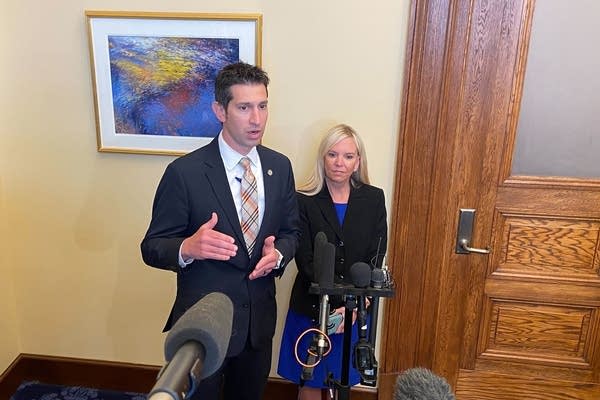Minnesota lawmakers finish deal on unemployment, bonuses

Go Deeper.
Create an account or log in to save stories.
Like this?
Thanks for liking this story! We have added it to a list of your favorite stories.
The Minnesota Legislature pushed through a bill Friday to give bonuses to workers who were on the front lines during the COVID-19 pandemic and to replenish the state’s unemployment insurance trust fund following months of negotiations.
Gov. Tim Walz said in a Twitter post Friday that he stepped out of his son’s volleyball game “to sign this important bill the minute we got it passed.”
He also posted a link to a new website that will allow workers to apply for the bonuses and outlines who may qualify.
Leaders of the Republican Senate and Democratic House majorities announced an agreement Thursday morning and moved to put together legislation and get it before both bodies for a vote on Friday. The final proposal includes $2.7 billion to refill the trust fund after it was depleted during the pandemic, and $500 million in bonuses of about $750 each for people whose jobs were deemed essential and who worked in-person.
Turn Up Your Support
MPR News helps you turn down the noise and build shared understanding. Turn up your support for this public resource and keep trusted journalism accessible to all.
The Senate passed the bill on a 65-1 vote Friday and sent it to the House, where it passed 124-5.
Lawmakers hoped to move quickly and get the bill passed and signed before a Saturday due date for employers who saw higher tax bills after legislators missed a March 15 deadline to refill the trust fund and avert an automatic tax hike on businesses. But officials from Minnesota's employment and economic development agency said Thursday that the state would have to issue credits or refunds to employers because it was too late to distribute updated tax bills.
The amount for front-line worker bonuses is half of House Democrats' original $1 billion proposal but twice as large as the $250 million allocated by lawmakers for the bonuses last year. That money was never distributed due to disagreements on eligibility requirements and amount per worker.
Democratic Sen. Erin Murphy, of St. Paul, told reporters after her chamber voted that there was “no reason at all” that lawmakers couldn't have used $1 billion of Minnesota's $9.25 billion budget surplus for front-line workers. “But,” she added, "$750 is real money. It's going to make a real difference for people.”
The National Federation of Independent Business in Minnesota, which represents more than 10,000 small businesses, praised lawmakers for the unemployment insurance plan.
“This is a huge win for small business owners across Minnesota,” John Reynolds, the group's state director, said in a statement. “The UI repayment deal stops higher payroll taxes this year and avoids a decade or more of higher unemployment insurance taxes. Main Street businesses who are facing mounting economic headwinds will start saving money almost immediately.”
___
Mohamed Ibrahim is a corps member for the Associated Press/Report for America Statehouse News Initiative. Report for America is a nonprofit national service program that places journalists in local newsrooms to report on undercovered issues.


